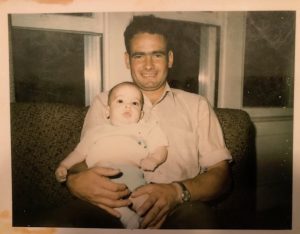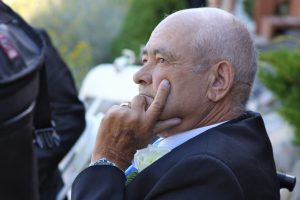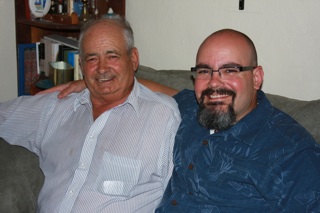Today is my dad’s birthday. He would have turned 77. I miss you dad.

Dad was always smart. He just didn’t have much opportunity or stomach for school. When I was a kid, he would always help me with my math, at least before we got into things like algebra and geometry. He knew his numbers, and was sharp, but he always preferred working instead of sitting in a classroom.
When he was a kid growing up in the rural countryside of Bizkaia, his mom tried to get him closer to school. She sent him to a caserio in Murelaga (today Aulestia) where he could get some extra schooling. This caserio was closer to a school and she hoped he could get more chances to learn. He was only about nine. To earn his keep, he had to get up and milk the cows every morning. The family had one daughter, who ended up marrying a guy dad called Txoria. Dad hated this guy. Txoria had a motorcycle and he made dad clean it any time he brought it over. So, first thing in the morning, dad had to milk the cows and, if it was there, wash Txoria’s motorcycle. And if dad messed anything up, did anything wrong, Txoria would grab his ear and twist it. He hated Txoria.
Dad spent two and a half years in that caserio. They put him in kindergarten, like he was two years old, even though he was nine and he knew all of the math. He never really got anything out of that school. His grandpa died a few years later, when he was eleven, and he used that as a reason to go home and never go back to Murelaga.

He started getting lessons from a woman in Munitibar, Mari Angeles Mallea, in the Sindikatu, one of the local bars where he also worked. Mari Angeles tutored him a couple of hours a day. He was sharp. He knew his numbers. “Shit, I was good.” The only thing he didn’t do well in was Spanish, he never learned much. He even helped his mom with her math. When she went out with her friends, drinking some wine, she would pay the whole bill because she didn’t know how to divide it. When he was nine, even before, he helped her figure out how to divide the bill so she didn’t pay for everyone all the time.
When dad was older, fourteen or so, his mom tried again, tried to get him in the seminary at Oñate. Dad wasn’t interested. The frailes would come and try to recruit him, but he would escape to the fields and pretend to work. His younger brother, Martin, ended up going, and very nearly became a priest, until he met his future wife Rosario…

As a kid, dad was always a bit more of a homebody than his brother. When they were younger, before dad was six, his mother took them to stay at a caserio named Astarlo, where she was from. Dad’s uncle, Eusebio, was sick back at their home and the kids were making too much noise, preventing Eusebio from getting the rest he needed, so his mom took dad and Martin to Astarlo. They were all talking until dad noticed his mom wasn’t there any more. I guess they hadn’t really told the boys what was going on. Dad said they tried to bribe him to stay, tried to tempt him with candies and cookies. It worked on his brother, who must have been three or four, but not dad. He followed her home. It was at least one and half miles, going up and down the mountainside. He caught up with his mom and went back home with her.
Even though dad was sharp and good with numbers, he just preferred to work. He took lessons from Mari Angeles for a few years, but then started working full time. When he was sixteen, only a few years before he left for the United States, he started working at another caserio — maybe named Urkija? — he was making 600 pesetas a week, which was a lot back then. He gave half of what he made to his mom and the rest was his. He never saved any of it. It was his job to bring meat home on Sundays. And with whatever was left, he’d spend a lot of it to help keep up the motorcycle, the only vehicle the family had. Dad had a lot of adventures with that motorcycle, but those are stories for another day.
Thanks to Lisa Van De Graaff for encouraging me to record dad and his stories when I could.
Discover more from Buber's Basque Page
Subscribe to get the latest posts sent to your email.


Love reading your stories! So blessed to have gotten to know my cousins, your dad and Martin❤️
Thanks Renee! Glad you enjoy them! 🙂
It was a pleasure to read the story of your dad Blas. I want to believe you miss him a great deal. The only thing we can do is to honor their memory as you are doing
Eskerrik asko Joseba! Yes, I hope to keep his memory alive through posts like this.
I follow and read with pleasure this blog from Aulesti (Murelaga). Here in the Lea-Artibai valley I have known quite a few Amerikanuak, I met some more on my trip to Boise for the Jaialdi 2010, I feel the need to preserve its history because it is our history.
There is a book “Kiñu baten -130urte”, which is detailed with many photos stories of people from Aulesti (1834-1964). It can be accessed and downloaded for free on the official website Aulesti.eus
http://www.aulesti.eus/eu-ES/Aulesti/Orriak/default.aspx
I hope you enjoy it and maybe get some interesting information. If you need help with translation or information about Aulesti baserris or surnames, I will be glad to help you.
Greetings
Iñigo kareaga Urizar
loperena71@hotmail.com
Mil esker Iñigo! I unfortunately do not know the name of the caserio where my dad spent some time as a child, he just said it was in Murelaga. He said it was large, easily large enough for two families, but only one lived there when he was there. And one of the people was called Txoria.
But, I look forward to looking through the document. Thanks for sharing!
Eskerrik asko zuri Blas eta Zorionak! for your interesting blog. It is enriching to know and interact with the Basque diáspora .
A group of friends from Aulesti have collected data on the baserris of our town (photos and a little history). We hope to publish it online, free acces. I think it can be an interesting resource for people who want information about their family or home of origin here in Aulesti-Murelaga.
Ondo izan,
Iñigo Kareaga Urizar